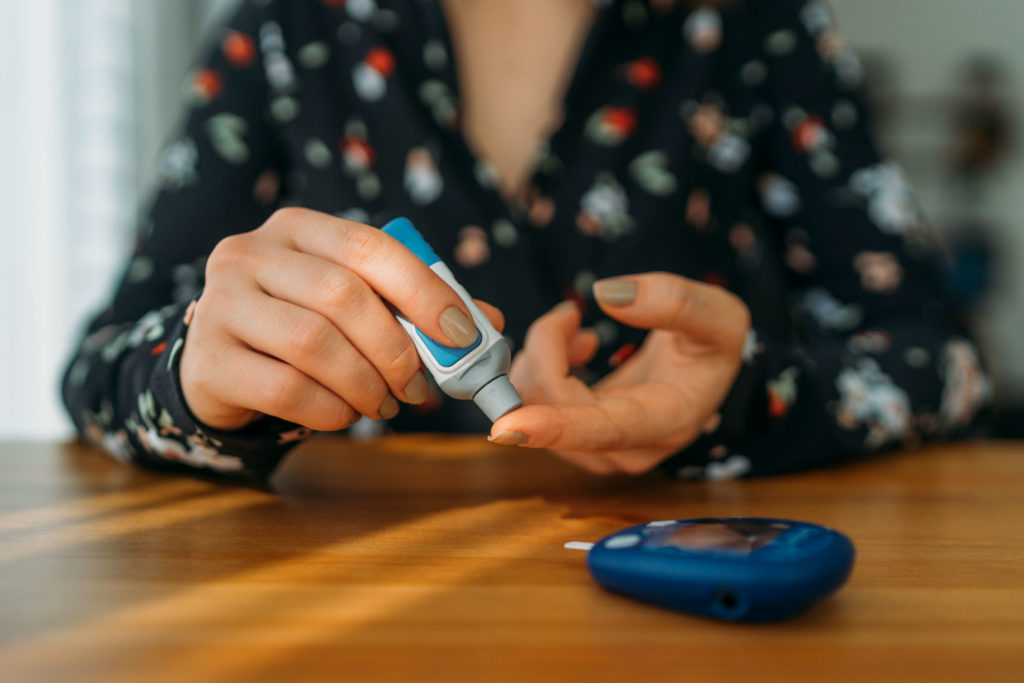In the last 10 years, this dangerous new trend of manipulating insulin doses to lose weight has emerged among women with diabetes and eating disorders. Several studies have come to the conclusion that women with type 1 diabetes are twice as likely to be diagnosed with an eating disorder as their non-diabetic peers. (Although diabulimia is more common among women, men with type1 diabetes can and do struggle with it as well.)
Living with type 1 diabetes is not easy. Sometimes insulin manipulation and other behaviors that indicate the person is struggling with an eating disorder start out as small acts of rebellion, but can escalate over time into an overwhelming cycle of eating disordered thoughts and symptoms.
For some people, the necessary emphasis on food and dietary restraint associated with the management of type 1 diabetes can create an unhealthy focus on food, numbers, and control. The psychological and emotional effects of having to manage a chronic medical condition such as type 1 diabetes can also play a role in developing the dual diagnosis of an eating disorder. Depression, anxiety and poor body image are also common co-occurring conditions.
The psychological and emotional effects of having to manage a chronic medical condition such as type 1 diabetes can also play a role in developing the dual diagnosis of an eating disorder.
The Dangers of Manipulating Insulin Dosages
Manipulating insulin dosages isn’t healthy and can be deadly. When an eating disorder accompanies type 1 diabetes, the mortality rate climbs to nearly 35 percent.
In addition to the increased risk of death, there is also an increase in the escalation of medical complications from diabetes such as vision loss and kidney failure. The health issues that a diabetic might typically expect to experience in 30 years can begin to occur within five or seven years if she is abusing insulin and exhibiting disordered eating behaviors.
For example, if a type I diabetic begins insulin manipulation at the age of 17, she could become totally blind, begin suffering from extreme nerve pain or need to be on a kidney transplant list by her mid-20s. Her ability to have children may be permanently compromised as well.
Signs of Insulin Abuse
If you are a parent, spouse, or family member of a diabetic, and you think believe she may be manipulating her insulin dosages to lose or maintain her body weight, it’s important to take action. The earlier you get seek help, the greater the possibility for a positive outcome. Here are some of the signs of insulin abuse:
- The person seems dehydrated, tired and irritable.
- The person’s insulin supply seems to be lasting them longer than expected. They purchase fewer bottles than usual.
- The blood sugar log on their glucometer shows that they have not been maintaining healthy levels.
- You might also encourage your loved one to go to their doctor for a Hemoglobin A1C test.
The earlier you get seek help, the greater the possibility for a positive outcome.
Share your concerns about their possible eating disorder with the doctor, if you can.
Get Help for Diabulimia
The complications from diabulimia and other disordered behaviors are very serious. Those who struggle with type 1 diabetes along with anorexia or bulimia can experience recovery with the right medical and psychological interventions. At The Meadows Ranch, our expert team of doctors and therapists can develop a personalized inpatient treatment program to help women and adolescent girls learn to control their diabetes while recovering from an eating disorder. We also offer The Meadows Ranch Eating Recovery Intensive Outpatient Program for both men and women at The Meadows Outpatient Center. Call today for more information: 866-332-5209.

